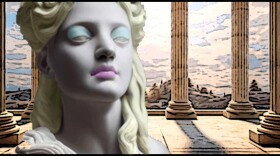-
Some composers, like Paul Dukas, are best known for one or two specific works, and on this week’s Sunday Opera (2/22 3:00 p.m.), we’re going to change that when we look at his only surviving opera “Ariane et Barbe-Bleue.” The extremely self-deprecating Dukas destroyed his other three operas, so we’re lucky to have this delightful version of the Charles Perrault fairytale.
-
It’s an afternoon of the music of Gabriel Faure on this week’s Sunday Opera (10/5 3:00 p.m.) as we return to the Bavarian State Opera for “Penelope” and follow that with three of his instrumental works to round out the afternoon.
-
Unrequited love that leads to tragedy is the theme for this week's Sunday Opera (9/7 3:00 p.m.) in a production of Jules Massenet's "Werther" from Paris’ Theatre des Champs-Elysee.
-
Our second look at the story of Manon Lescaut continues from the Teatro Regio on this week’s Sunday Opera (8/3 3:00 p.m.) with Massanet’s treatment of the story by Antoine Prevost. In this one, Manon doesn’t die in the wilderness or desert of Louisiana, she dies of exhaustion on the road to Le Havre to be deported.
-
We have the first of three different Manons on this week’s Sunday Opera (7/27 3:00 p.m.) with Daniel Auber’s 1884 treatment of Abbe Prevost’s 1731 novel, “Manon Lescaut.” Auber’s work of the three we’ll be airing (the others by Massenet and Puccini) is probably the loosest adaptation of Prevost, but it still ends tragically for its titular character.
-
It’s the Opera Comique for the venue of this week’s work by Jean-Paul Rameau: “Les Fetes d’Hebe” (“The Festivals of Hebe or The Lyric Talents) on the Sunday Opera (7/20 3:00 p.m.). The performance features a cast of nine lead by Wiliam Christie and the Orchestra and Chorus of Les Arts Florissants. True to most Baroque operas, the work consists of a prologue and three acts, and since this is Rameau, it’s one of his opera-ballets, filled with some of his lovely charming music.
-
Although Giacomo Meyerbeer was one of the most celebrated composers during his lifetime and wrote some sixteen operas, many of his works often go overlooked. We’re going to remedy that, a bit, on this week’s Sunday Opera (5/25 3:00 p.m.) with a recording of his last work, “L’Africaine” or “Vasco da Gama” in its edited final version.
-
We’re dusting off some English history on this week’s Sunday Opera (4/20 3:00 p.m.) through a work by Camille Saint-Saens, a live 1991 recording of his rarely performed “Henry VIII.” The libretto by Armand Silvestre and Leonce Detroyat looks at a small section of the infamous life of a man driven by ego, a thirst for power, and the overpowering need to have a male heir.
-
“La Juive,” a tragic tale of religious intolerance by Fromental Halevy, will air on this week’s Sunday Opera (3/2 3:00 p.m.). Eugene Scribe wrote the libretto for this opera which became one of the most popular of the 19th century after its premier in Paris on 23 February 1835. It deals with the plight of Jews in Switzerland in the 15th century, particularly Rachel and her adoptive father Eleazar who are persecuted by the Catholic Church and are arrested after it is found that Rachel’s love Samuel is actually a Christian.
-
Although you may not know the opera on this week’s Sunday Opera (2/9 3:00 p.m.), we have no doubt you’ll recognize one of the arias as it’s been a mainstay of concert performances for many years. The opera is “Mignon” by Charles Ambroise Thomas, the thirteenth of his twenty-three operas.
WWFM
Phone: 609.587.8989
Toll-free: 888.232.1212
Address:
Mercer County Community College
1200 Old Trenton Rd.
West Windsor, NJ 08550
© 2026 WWFM
Phone: 609.587.8989
Toll-free: 888.232.1212
Address:
Mercer County Community College
1200 Old Trenton Rd.
West Windsor, NJ 08550
© 2026 WWFM

Play Live Radio
Next Up:
0:00
0:00
Available On Air Stations










